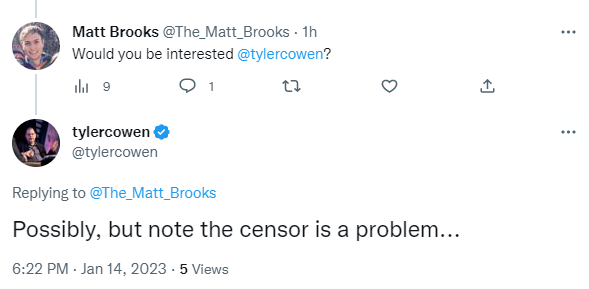Tyler Cowen was on the Jan 9th episode of ChinaTalk, a podcast hosted by Jordan Schneider.
Podcast: https://link.chtbl.com/GEYO9yFn
China Talk Substack: https://www.chinatalk.media/about
At 39:45 Tyler mentions writing a book to improve US relations with China that will likely never be published. We should help him publish it!
Edit: Tyler is interested although worried about censorship

I transcribed this part of the podcast with Whisper, so there may be mistakes. Go listen to the entire episode anyway, it’s worth a listen.
Transcription
Jordan
So shortly, millions of Chinese nationals who've been playing World of Warcraft their entire lives will no longer be able to. I'm curious, how important shared cultural touchstones, like video games, the NBA and Marvel movies are to keeping the peace?
Tyler
I don't know, we had plenty such touchstones with, say, Germany before World War I, World War II, it didn't matter. But certainly worth trying, you know, I had my own project to improve relations with China, which failed, by the way. I wrote a manuscript for a book, and my plan was to publish it only in China. And it was a book designed to explain America to the Chinese, and make it more explicable, more understandable. So I wrote the book, I submitted it to Xinhua, which gave me a contract, even paid me in advance. But then a number of events came along, most specifically the Trump trade wars, and the book never came out. They're still sitting on it. I don't think it will ever come out. That was my, you know, you could call it, misguided project, to just do a very small amount to help the two countries get along better.
Jordan
Wow, what were your, what were your themes?
Tyler
Well, if you think of Tokvill, he wrote democracy in America, so that Europeans would understand America better, right? So I thought, well, if we're trying to explain America to Chinese people, it's a really very different set of questions, especially in the 21st century. Though I covered a lot of basic differences across the economies, the policies, why are the economies different?
Why is there so little state ownership in America?
Why are so many parts of America so bad at infrastructure?
Why do Americans save less?
How is religion different in America?
That was, I think, an especially sensitive topic. And just try to make sense of America for Chinese readers, but not defending it. Just some kind of, all of branch of understanding. Here's how we are. And I don't know. I don't think they'll ever put the book out. And of course, by now, it's out of date.
Jordan
Yeah, but there's, I mean, there's plenty of other people. Other like countries on the planet who could use a little, you know, a civics 101.
Tyler
They could. I mean, this is a book written for Chinese people with the contrasts and data comparisons to China. So to sort of send the same book to, you know, Senegal, I don't think would really make sense.
Jordan
Yeah, but if you publish it in the US, it will like, you know, Osmos out. I don't think it needs to be published by Xinhua for Chinese people to read it, Tyler.
Tyler
I've thought of having it translated into Chinese distributed Somersault in some way. Haven't ruled that out. No downside for me, but you want to do things right. And I kept on waiting for Xinhua. And now I've really completely given up. The book is out of date with facts. That's not a big problem. Facts you can update, but it's very out of date with respect to tone. So right now, everyone feels you need to be tough with China. You can't sort of say nice things to China about China, you're pandering. You look like LeBron James or you're afraid to speak up. And the book would have made a lot of sense, say in 2015 that its current tone doesn't make sense in the current environment, even though I still like the current tone, but it would be misread as something it's not.
Jordan
Well, I think it's, I think it's a more important book in 2023 than it was in 2015.
Tyler
It probably is. So, you know, it will have some future. I'm still thinking about it trying to get that right. By the way, this is the only time I've ever discussed this publicly. So breaking news here on the China talk.
Jordan
No, but seriously, someone out there who's listening to this is a translator or works at a publishing house that might make a little more sense than the Chinese state, you know, apparatus. So yeah, get in touch with me or Tyler. Let's peer pressure him into making this thing happen.
What can we do to help?
This seems like a great way for the EA community to help. OpenPhil or someone else with a bit of experience and prestige should reach out to Tyler and ask how they can best help get this book updated, translated, and published.
They can do all of the annoying or tedious work he doesn't want to do, like hire and manage a really great translator, do the basic research to update the facts (with his signoff), etc.
I think it would be pretty cheap and easy to do with almost no downside risk. There’s some great potential to reach many Chinese readers and increase cultural understanding at a time when tensions are rising.



Tokvill > Tocqueville